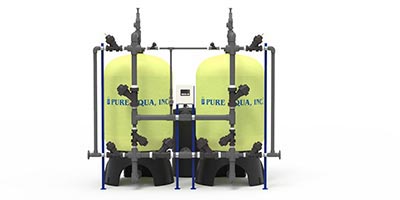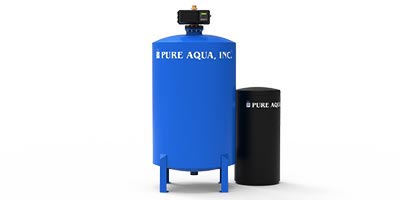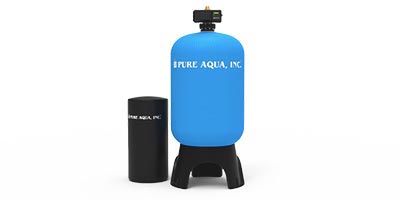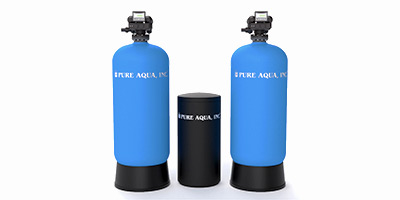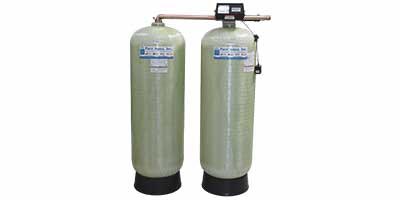Through the process of ion-exchange, water softener systems work in removing magnesium and calcium found in the water by replacing them with sodium ions. As the hard water is introduced in the mineral tank, it meets a bed of resin beads that grab hold of the mineral ions, which effectively releases the sodium ions.
When water is hard, it can clog pipes, damage boilers, heat exchangers, and many other devices. Water softener system can prevent these negative effects. Hard water causes a higher risk of lime scale deposits in industrial, commercial and household water systems.
Water softener systems are capable of working to their fullest capacity for up to 20 years. Our water softeners are designed for maximum durability and reliability in regards to system malfunction. Other advantages that a water softening equipment supplier provides include:
Advantages For Water Softener Systems:
- Disallowing the buildup of scale from occurring in your home, business, industrial facility
- Extends the lifespan of your equipment or appliances (as a result of eradicating scaling)
- Provides more comfort to humans who are exposed to hard water and accumulate unwanted symptoms such as itchy skin, and discolored hair
- Automatically regenerated (Time-clock or metered)
Exchange Capacity
160K to 4,200K Grains
Service Flow Rates:
40 to 1,000 GPM
- Epoxy Coated Carbon Steel Tanks
- Diaphragm or Butterfly Valves
- Digital Stager or PLC
- Tanks: 24" to 84" Diameter
Exchange Capacity
90K to 1,800K Grains
Service Flow Rates:
15 to 300 GPM
- Fiberglass (FRP) Tanks
- Diaphragm or Butterfly Valves
- Digital Stager or PLC
- Tanks: 14" to 63" Diameter
Exchange Capacity
90K to 210K Grains
Service Flow Rates:
19 to 220 GPM
- Epoxy Coated Carbon Steel Tanks
- Fleck Control Valves
- Automatic or Manual Backwash Valves
- Tanks: 14" to 60" Diameter
Exchange Capacity
60K to 1,800K Grains
Service Flow Rates:
18 to 300 GPM
- Fiberglass (FRP) Tanks
- Fleck Control Valves
- Automatic or Manual Backwash Valves
- Tanks: 12" to 63" Diameter
Exchange Capacity
15K to 600K Grains
Service Flow Rates:
8 to 95 GPM
- Fiberglass (FRP) Tanks
- Magnum Autotrol Control Valves
- Automatic Backwash Valve
- Tanks: 7” to 36” Diameter
Exchange Capacity
60K to 1,800K Grains
Service Flow Rates:
9 to 300 GPM
- Fiberglass (FRP) Tanks
- Clack Control Valves
- Automatic Backwash Valve
- Tanks: 7" to 63" Diameter
Exchange Capacity
15K to 300K Grains
Service Flow Rates:
8 to 30 GPM
- Fiberglass (FRP) Tanks
- Fleck Control Valves
- Automatic Backwash Valve
- Tanks: 7" to 24" Diameter
Exchange Capacity
15K to 300K Grains
Service Flow Rates:
11 to 49 GPM
- Fiberglass (FRP) Tanks
- Fleck Control Valves
- Automatic Backwash Valve
- Tanks: 7" to 24" Diameter
Pure Aqua has over 20 years of experience as a global supplier of water softener systems throughout various industries and applications. Our team provides water softening solutions to industrial, commercial, and residential areas that require the reduction of hardness levels in their water. Low cost, high reliability, and long-term use have made the water softener systems produced at Pure Aqua considered to be the most premier of its kind.
When water is hard, it can clog pipes, damage boilers, heat exchangers, and many other devices. Water softener system can prevent these negative effects. Hard water causes a higher risk of lime scale deposits in industrial, commercial and household water systems.
Due to this lime scale build-up, pipes are blocked and the efficiency of hot boilers and tanks is reduced. This increases the cost of domestic water heating by about fifteen to twenty percent.
Another negative effect of lime scale is that it has damaging effects on commercial machinery, such as laundry machines. Water softening using a water softener system expands the life-span of each machine. It also contributes to the improved working, and longer lifespan of solar heating systems, air conditioning units and many other water-reliant systems.
What Do Water Softeners Do?
Industrial water softener system are specific ion exchangers that are designed to remove ions which are positively charged.
Softeners mainly remove calcium (Ca2+) and magnesium (Mg2+) ions. Calcium and magnesium are often referred to as “hardness minerals”. Softeners are sometimes even applied to remove iron from water.
The softening devices are able to remove up to five milligrams per liter (5 mg/L) of dissolved iron and can operate automatic, semi-automatic, or manual. Each type is rated on the amount of hardness it can remove before regeneration is necessary. Commercial water softeners collect hardness minerals within its conditioning tank and from time to time flushes them away to drain.
When an ion exchanger is applied for water softening, it will replace the calcium and magnesium ions in the water with other ions, for instance sodium or potassium. The exchanger ions are added to the ion exchanger reservoir as sodium and potassium salts (NaCl and KCl).
How Long Does A Water Softener Last?
A good water softening equipment supplier will deliver a system that can last 15 years. Water softeners that were supplied in the early 2000's may still work, and many need little maintenance, besides filling them with salt occasionally.
While water softeners do not last forever, they are designed to have long-lasting life value. Pure Aqua’s water softener systems can work well for up to 20 years, which makes our systems some of the most durable designs on the market.
How Often Should One Add Salt To A Softener?
Salt is usually added to the reservoir during regeneration of the softener. The more often a softener is regenerated, the more often salt needs to be added. Usually water softeners are checked twice a month and to guarantee a satisfactory production of soft water, the salt level should be kept at least half-full at all times.
Additional Benefits Of Water Softener Systems
A water softener supplier such as Pure Aqua manufactures quality softening systems that ensure softer and cleaner clothes by removing the minerals that cause hardness, such as calcium and magnesium. The advantages of these systems include:
- Longer life span of appliances such as dishwasher, washing machine, and water heaters.
- Immense cost-savings with less need for commercial chemical and cleaning products
- Less water spotting
- Reduction of maintenance costs
- Cutback on water and energy consumption
APPLICATION FOR WATER SOFTENER SYSTEMS:
For user's that require additional information before deciding the need for a water softener, please see our blog section regarding water softening.
 ENGLISH
ENGLISH ESPAÑOL
ESPAÑOL العربية
العربية PORTUGUÉS
PORTUGUÉS FRANÇAIS
FRANÇAIS


